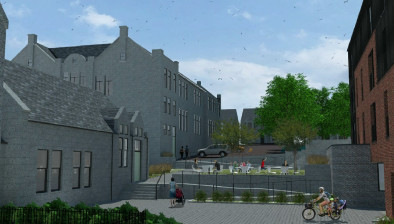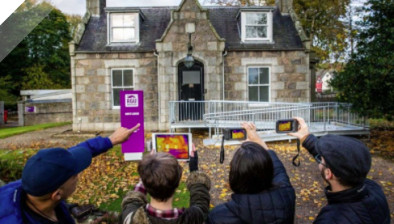Albyn secures funding for project which predicts elderly falls in homes

A ground breaking new project which aims to develop an effective falls prediction system that can be installed in peoples’ homes has secured almost £100,000 in new funding.
Led by a unique Highland-based partnership between Albyn Housing Society, Robert Gordon University, Carbon Dynamic and NHS Highland, the project will collect data from sensors installed in specially designed ‘FIT Homes’.
The data will then be analysed using state-of-the-art data science algorithms to identify behaviours linked to increased fall risk.
With falls currently costing the NHS over £2 billion and four million bed days each year, it is hoped the resulting system will help residents live well and independently in their homes for longer, prevent hospital admissions and even enable early discharge.
The funding from the Data Lab – the Scottish Innovation Centre charged with generating economic, social and scientific value from big data – will support the development of a ‘test bed’ in the form of inhabited ‘FIT Homes’ at locations across the Highlands.
Built of modular timber construction and co-designed by a variety of stakeholders including patients, clinicians and potential tenants, the ‘FIT Homes’ will contain multiple layers of sensors and smart resident interfaces.
Lucy Fraser, head of innovation at Albyn Housing Society, said: “The central concept of these high-quality, sustainable homes is that they will include ambient, physiological and building sensors to collect data that can be monitored and responded to by a variety of agencies – potentially transforming the way health and social care is delivered.
“Falls in particular are of great concern to vulnerable residents, their families and the health and care sector, given the growing impact they are having on services. So by looking at data surrounding areas such as dehydration, diet, the use of certain prescribed medication and levels of activity and social interaction, we hope to develop a means of using digital technology to enable families and agencies to intervene with preventative measures before incidents can occur. This could transform countless lives as populations across the globe continue to grow older.”
 Professor Susan Craw, the artificial intelligence expert at RGU leading this research, added: “This exciting project is an excellent example of the ways that Artificial Intelligence is beginning to be used to assist and benefit individuals through applications with a social purpose. People now use wearable sensors and mobile apps to monitor their activities and provide advice for a healthy lifestyle. In this project we shall be using data from sensors embedded in the technology-enabled ‘FIT Homes’ to capture activities and behaviours within the home and provide alerts when these indicate an increased risk of falling.
Professor Susan Craw, the artificial intelligence expert at RGU leading this research, added: “This exciting project is an excellent example of the ways that Artificial Intelligence is beginning to be used to assist and benefit individuals through applications with a social purpose. People now use wearable sensors and mobile apps to monitor their activities and provide advice for a healthy lifestyle. In this project we shall be using data from sensors embedded in the technology-enabled ‘FIT Homes’ to capture activities and behaviours within the home and provide alerts when these indicate an increased risk of falling.
“This project builds on two leading-edge Artificial Intelligence technologies: recognising human activities from real-time sensor data, and understanding these activity profiles to find similarities with the behaviour of other people and to recognise changes in activity patterns. Alerts to the resident/family or healthcare professionals will be based on activity profiles and so are backed up by evidence from real-life behaviour. The system will learn from known precursors of falls but will also be able to discover new indicators of risk of falling. I am delighted that Artificial Intelligence is being used in this innovative project to support our ageing population and promote independent living.”
Gillian Docherty, CEO of The Data Lab, said: “Partnerships like this one help us to retain our home grown talent and help Scotland to cement its place as a leader in data science development worldwide.
“According to The Centre for Economic and Business Research Data, big data opportunities in Scotland will be worth £20bn over the next three years, so it’s important that we continue to challenge ourselves to generate economic, social and scientific value from this sector.”
Set to commence this May, the first phase of FIT Homes, which will include 15 new homes and one community space, is planned for Albyn Housing Society’s new site at Dalmore, Alness. A further 32 houses, including homes for veterans, will be built in Inverness and the surrounding area.
The innovative homes are constructed off-site by Carbon Dynamic and delivered to their location for final completion.
The Digital Health and Care Institute, Censis, the Scottish Government and the Highland Council are also supporting the wider FIT Homes project.









